Best Podcast Platforms for 2025 [Side by Side Comparison]
New podcasters often ask us “What’s a podcast hosting platform, and how do I pick the right one?” Finding the best platform can feel like a big challenge, whether you’re just starting or already experienced. Everyone’s looking for simple tools, useful features, and great ways to make money from their podcast.
In this article, we’ll break down the top podcast platforms for 2025 and help you decide which one works best for you.
Table of contents
Key Features to Consider in a Podcast Hosting Platform
Remember the following key features when looking for a podcast platform:
- ✨ Easy to use: Pick a platform with a simple, user-friendly design.
- 💸 Monetization options: Go for a platform that lets you earn money through ads, subscriptions, or donations.
- 📈 Analytics: Choose one that gives you detailed stats to understand your audience and improve your podcast.
- 🤝 Tool integration: Look for platforms that connect easily with editing tools, social media, and websites to make your work smoother.
- 📥 Storage and bandwidth: Make sure it can handle your content without losing quality.
- 🦸♂️ Customer support: Good support can save you time and solve problems fast.
Top Podcast Platforms for 2025
Here are the top podcast platforms for 2025, each offering unique features to meet various podcasting needs:
| Platform | Pros | Cons | Pricing |
|---|---|---|---|
| Spotify for Podcasters | Extensive reach, excellent analytics | Limited customization | Free |
| Apple Podcasts | Wide reach, user-friendly | Limited analytics | Free |
| Podbean | Great monetization, detailed analytics | Higher cost for advanced features | Free, $9+/month |
| Buzzsprout | User-friendly, detailed analytics | Limited storage on lower plans | $12+/month |
| Transistor | Advanced features, excellent support | Higher cost | $19+/month |
| Captivate | Advanced analytics, marketing tools | Higher cost | € 19+/month |
| Libsyn | Reliable, comprehensive features | Outdated interface | $5+/month |
| Stitcher | High-quality content, exclusive shows | Limited hosting features | Free, premium content |
| Acast | Advanced ad-insertion, good for high-volume podcasts | Expensive for small creators | Free plan, premium $14.99+/month |
| Zencastr | Great for remote interviews, simple interface | Free plan has limitations, not ideal for large teams | Free plan, premium $18+/month |
| RSS | User-friendly, easy to set up | Limited analytics and customization | From $4.99/month for students and NGOs |
| Simplecast | Advanced analytics, good marketing features | Can overwhelm beginners | $15+/month |
| Spreaker | Good monetization tools, simple interface | Limited analytics on free plan | Free, premium $20+/month |
1. Spotify for Podcasters
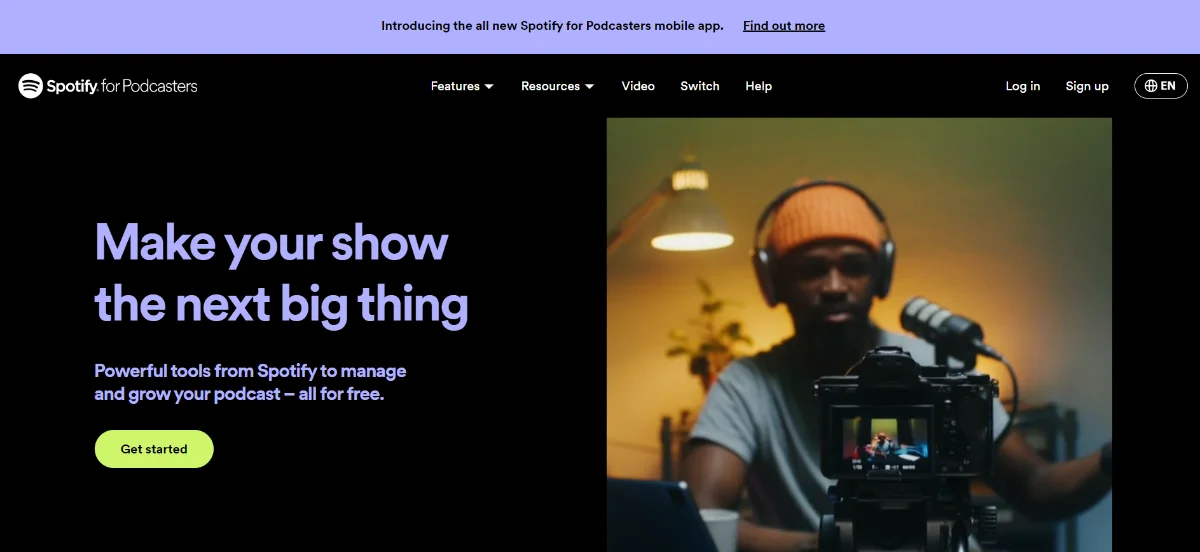
Spotify for Podcasters offers wide reach and seamless integration with the Spotify app. It provides detailed analytics and various monetization options.
Pros: Spotify offers a wide reach, excellent analytics, and good monetization options. With its large listener base, your podcast can easily gain visibility and attract a diverse group of listeners. The platform’s robust analytics give insights into listener demographics, episode performance, and engagement, helping you to know your audience and refine your content strategy. Spotify for Podcasters also offers various monetization options, including ads and sponsorships, making it easy to generate revenue.
Cons: Customization options are limited. Podcasters looking to create a unique brand identity might find the standard templates and limited design choices restrictive. Customization is minimal in areas such as player appearance, website integration, and branding elements compared to other platforms.
Pricing: Free
2. Apple Podcasts
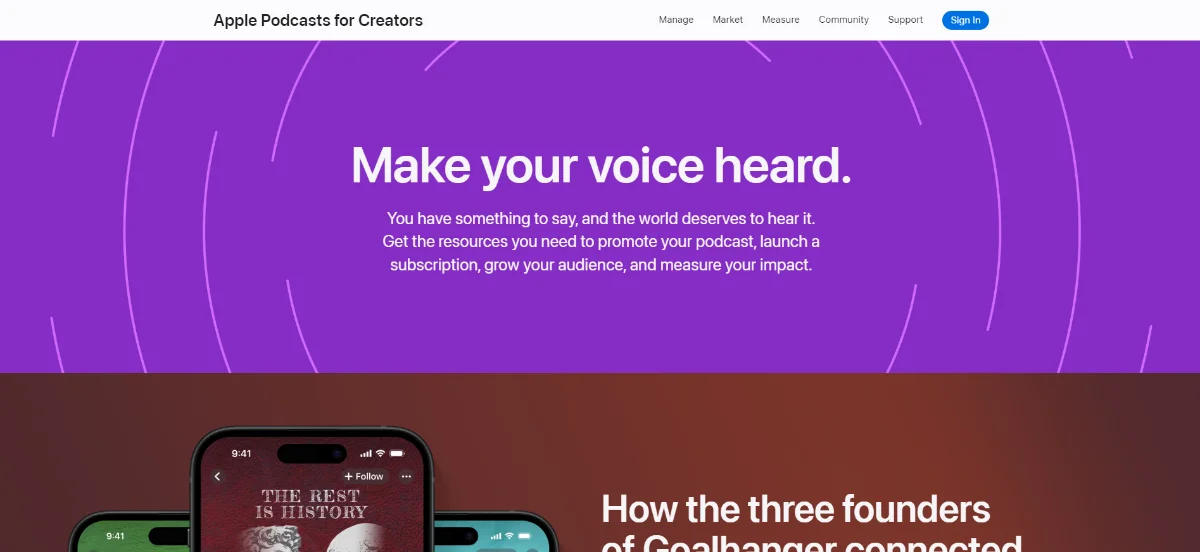
Who wouldn’t know Apple Podcasts? It's one of the most recognized podcast platforms globally, seamlessly integrated with the Apple ecosystem.
Pros: Apple Podcasts offers a huge audience thanks to Apple’s massive user base. Its user-friendly interface makes it easy for listeners to find and subscribe to podcasts. Plus, the platform’s strong brand adds credibility and trust to your show.
Cons: The analytics are basic. Unlike other platforms, Apple Podcasts doesn’t provide detailed insights into listener behavior or demographics, which can be a downside if you rely on data to improve your content and marketing.
Pricing: Free!
3. Podbean
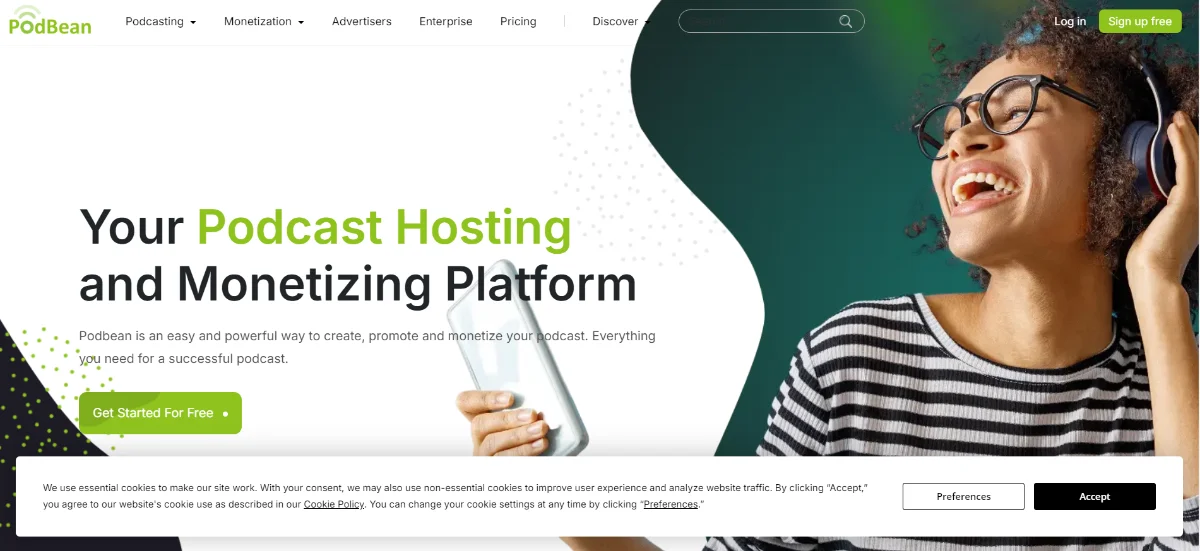
Podbean offers great features like monetization options and detailed analytics, making it a popular pick for serious podcasters. Its easy-to-use interface helps you manage your podcast without hassle. Podbean also provides tools to promote your show and grow your audience. Plus, it integrates smoothly with major podcast directories, helping your podcast get noticed.
Pros: Podbean provides excellent monetization options, including ads and listener support, allowing podcasters to earn money. Its detailed analytics give useful insights into listener behavior, helping you improve your content and marketing.
Cons: Advanced features are only available with higher-tier plans, which can be expensive for some users. This might not be ideal for those with a tight budget or just starting out.
Pricing: Podbean has a free plan, and premium plans start at $9/month.
4. Buzzsprout
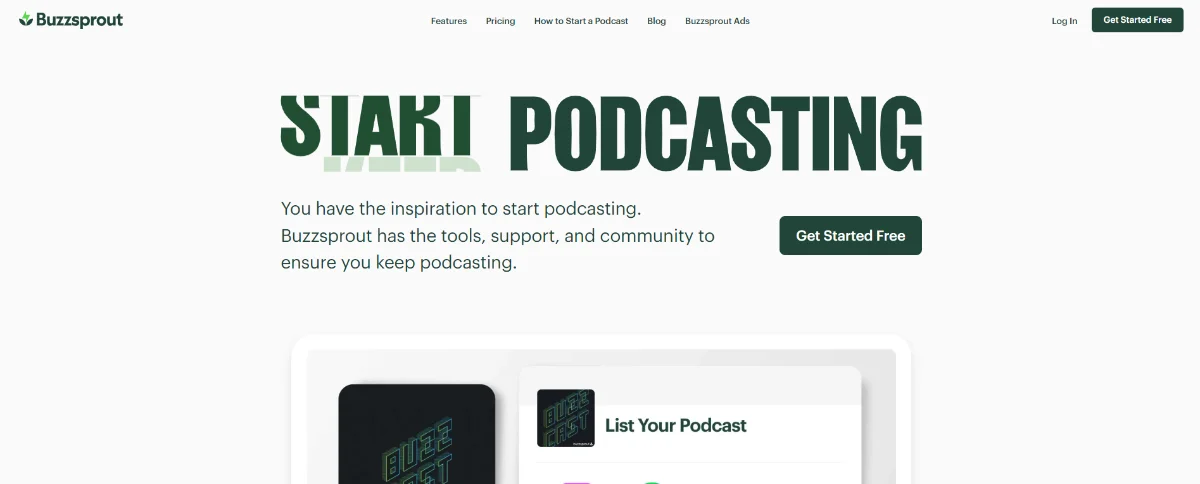
Buzzsprout is easy to use and provides detailed analytics, making it a solid option for both beginners and experienced podcasters. Its simple interface makes uploading, editing, and managing episodes hassle-free, so even new podcasters can get started quickly. Plus, Buzzsprout’s integration with major podcast directories helps improve your show’s visibility.
Pros: Buzzsprout’s user-friendly design ensures tasks are straightforward and easy to understand. The platform’s detailed analytics give insights into listener behavior, demographics, and episode performance, helping podcasters improve their content and marketing.
Cons: Lower-tier plans come with limited storage and upload limits, which can be a drawback. Podcasters producing frequent or long episodes may need to upgrade to a higher-tier plan for more storage.
Pricing: Buzzsprout has a free plan, but it includes ads on your podcast. Premium plans start at $12/month, removing ads and adding features like advanced stats and extra storage, ideal for growing podcasts.
5. Transistor
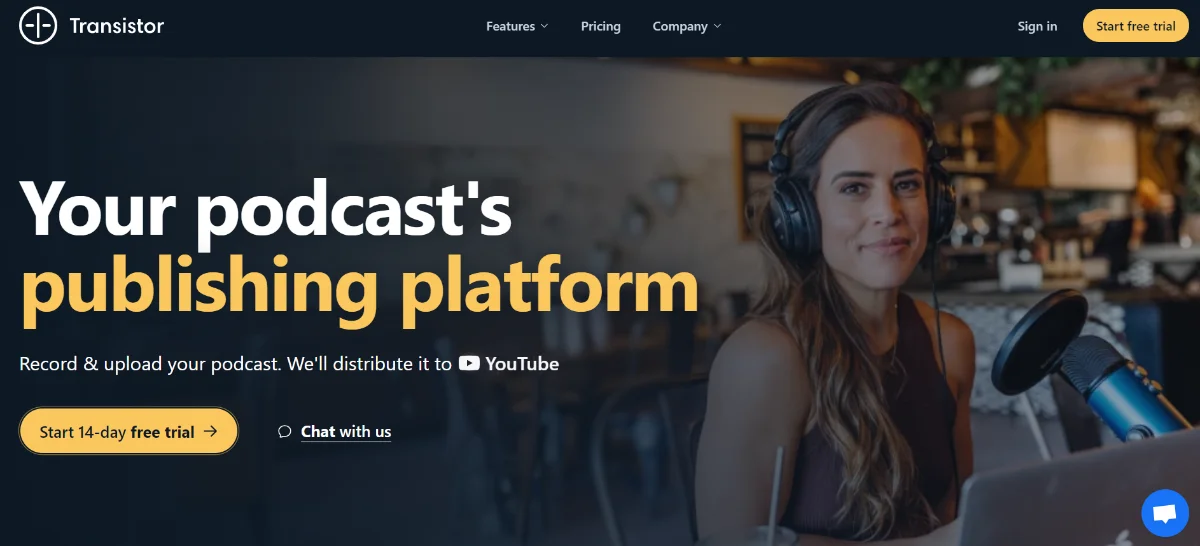
Transistor is specifically tailored for professional podcasters, providing advanced features and excellent support. It offers a wide range of tools to assist podcasters in creating, distributing, and monetizing their content effectively. Transistor's platform is designed to meet the needs of serious podcasters, offering detailed analytics and seamless integrations with major podcast directories.
Pros: Transistor offers advanced features and excellent support. It stands out with its robust set of advanced features, including detailed audience metrics, private podcasting options, and multiple user accounts. The platform also provides highly responsive customer support, ensuring that podcasters receive the help they need quickly.
Cons: The higher cost of Transistor's plans may be a barrier for new or budget-conscious podcasters. While the platform offers professional-grade tools and support, the pricing may be more than what casual podcasters require.
Pricing: Transistor's pricing starts at $19 per month, providing access to powerful features and support. This plan is designed for podcasters who are ready to invest in their craft and need advanced capabilities to grow their audience and monetize their content.
6. Captivate
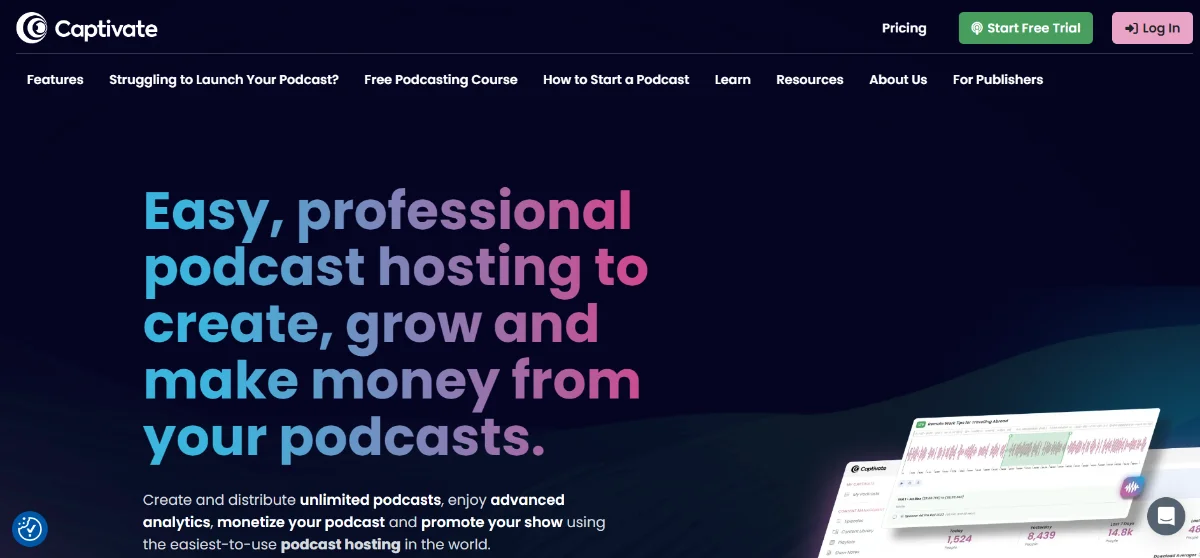
Captivate offers advanced analytics and marketing tools, making it ideal for podcasters looking to grow their audience. The platform provides a user-friendly interface that simplifies podcast management while offering features to help podcasters increase their reach and engagement. Captivate's integration with various marketing tools helps users effectively promote their podcasts.
Pros: Captivate excels in offering detailed analytics that give podcasters deep insights into their audience and episode performance. Its robust marketing tools, such as customizable call-to-action links and built-in email capture forms, make it easier to attract and retain listeners.
Cons: Higher cost. While Captivate provides a wealth of features, its higher pricing might be a drawback for those on a tighter budget. The cost reflects the advanced capabilities and marketing resources, which are best suited for podcasters serious about growing their audience.
Pricing: Captivate’s pricing starts at € 19 per month, which includes access to its comprehensive suite of analytics and marketing tools. This investment is ideal for podcasters who are committed to expanding their audience and need professional-grade features to do so.
7. Libsyn
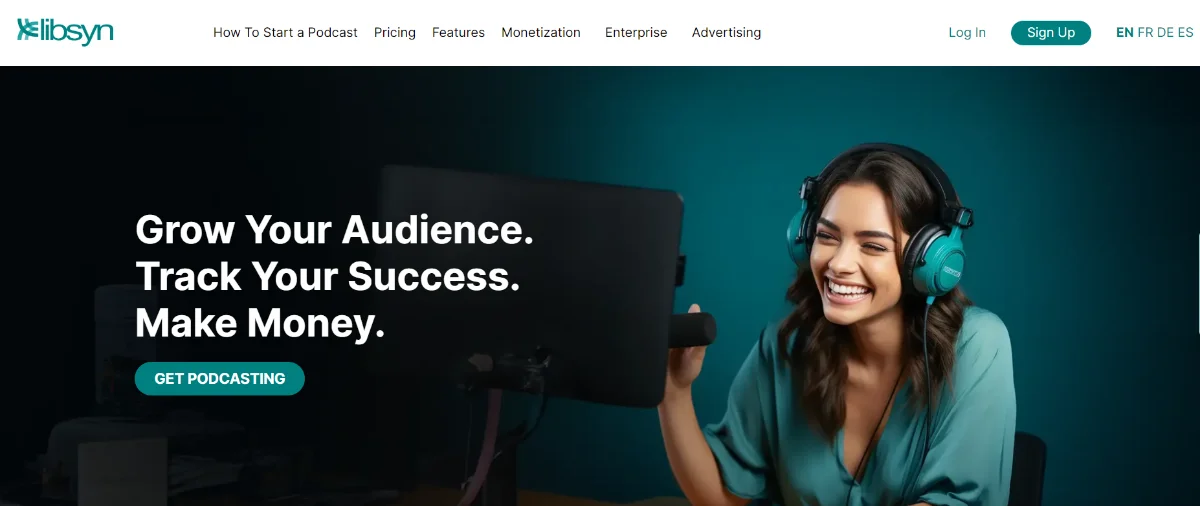
Libsyn is considered one of the oldest and most reliable podcast hosting platforms. It has a strong reputation in the podcasting community and offers a comprehensive set of tools to help podcasters manage, distribute, and monetize their content. Many podcasters trust Libsyn due to its stability and extensive feature set.
Pros: Libsyn's reliability ensures that your podcast episodes are hosted and distributed without interruption. The platform offers a wide range of features, including detailed analytics, monetization options, and the ability to publish to multiple destinations. This gives podcasters everything they need in one place.
Cons: Platform’s interface may feel outdated and less intuitive compared to newer platforms, affecting the user experience, particularly for those who prefer modern design and navigation.
Pricing: Libsyn offers affordable pricing plans starting at $5 per month, making it accessible for podcasters at all levels. These plans provide essential features, with higher-tier options available for those needing more advanced capabilities and storage.
8. Stitcher
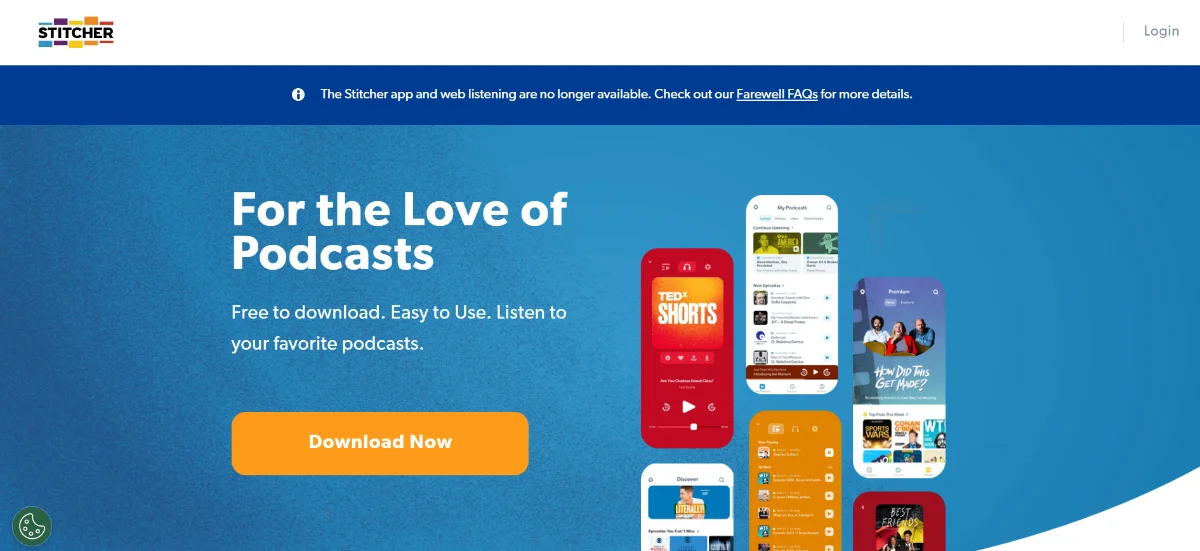
Stitcher is well-known for its high-quality content and exclusive shows, providing a unique platform for podcasters. With a focus on delivering top-tier audio entertainment, Stitcher offers listeners a variety of exclusive and original podcasts. This platform is particularly appealing to those seeking access to premium content.
Pros: Stitcher offers a wide variety of high-quality podcasts, including exclusive shows not available on other platforms, making it a top choice for listeners looking for unique and engaging content.
Cons: While Stitcher excels in content quality, it lacks comprehensive hosting features for podcasters. This limitation means podcasters might need to use additional services for hosting and distribution.
Pricing: Free, with premium content available. Stitcher offers free access to many podcasts, but also provides a premium subscription option. Premium subscribers get access to exclusive shows, ad-free listening, and early access to new episodes, enhancing their overall listening experience.
9. Acast
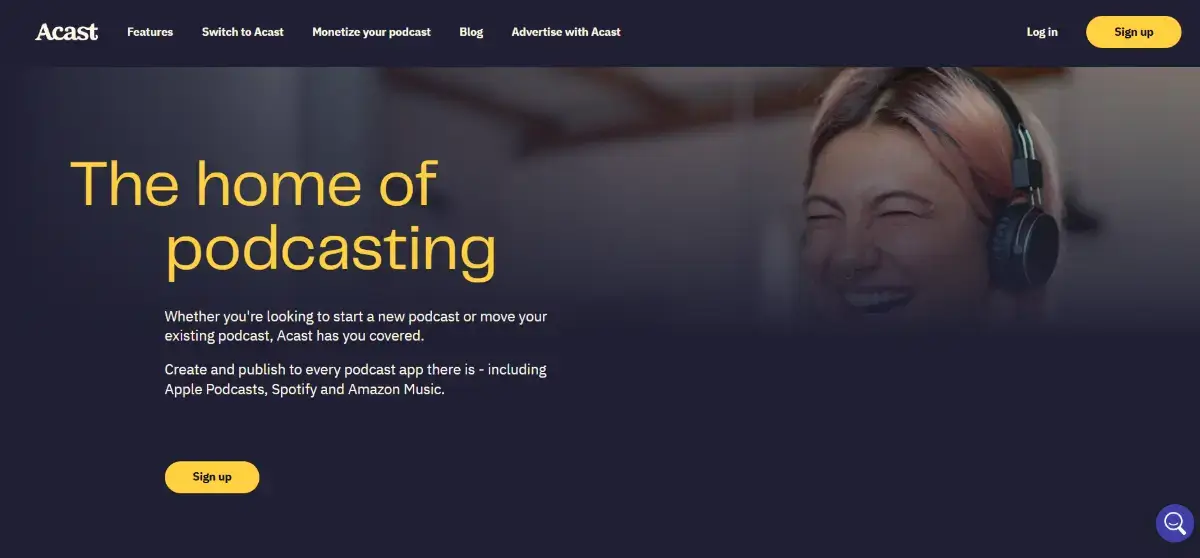
Acast is a versatile hosting platform, ideal for podcasters looking to monetize their content effectively while reaching a global audience.
Pros: Acast offers excellent monetization tools, including dynamic ad insertion, sponsorship opportunities, and listener donations. It also features analytics that provide valuable insights into listener behavior, helping you optimize your content.
Cons: Some advanced features require higher-tier plans, which may not suit beginners or hobbyists.
Pricing: Free plan available, premium plans start at $14.99/month.
10. Zencastr
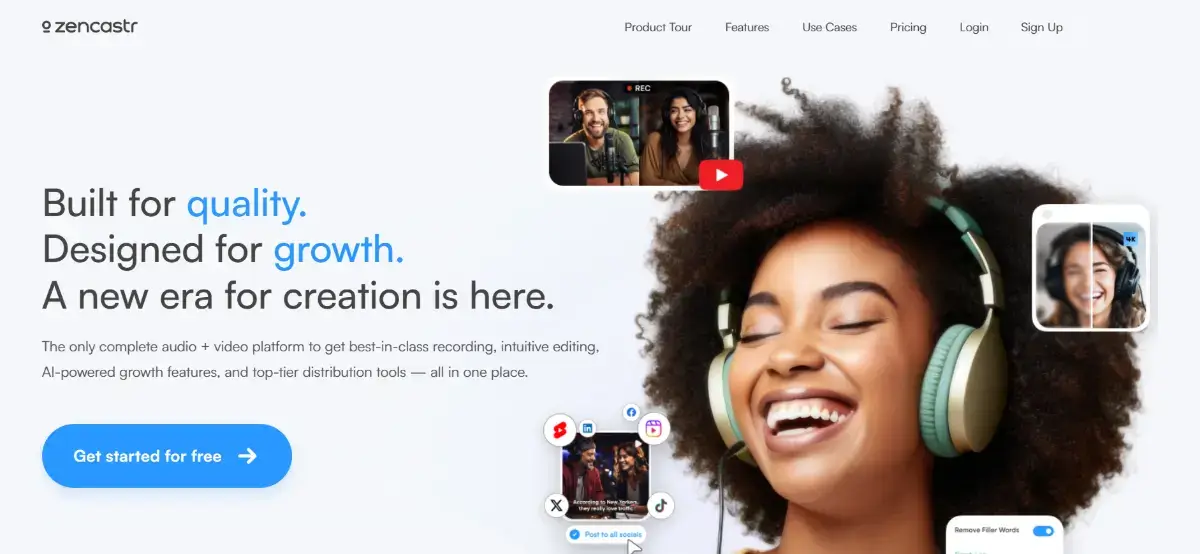
Zencastr is known for its high-quality remote recording capabilities, now expanding into hosting services.
Pros: It provides crystal-clear audio recording directly from your browser and offers integrated hosting options, making it a one-stop solution for podcast creation and distribution.
Cons: Limited hosting features compared to more established platforms. The focus remains on recording quality rather than hosting flexibility.
Pricing: Free plan available; premium plans start at $18/month.
11. RSS
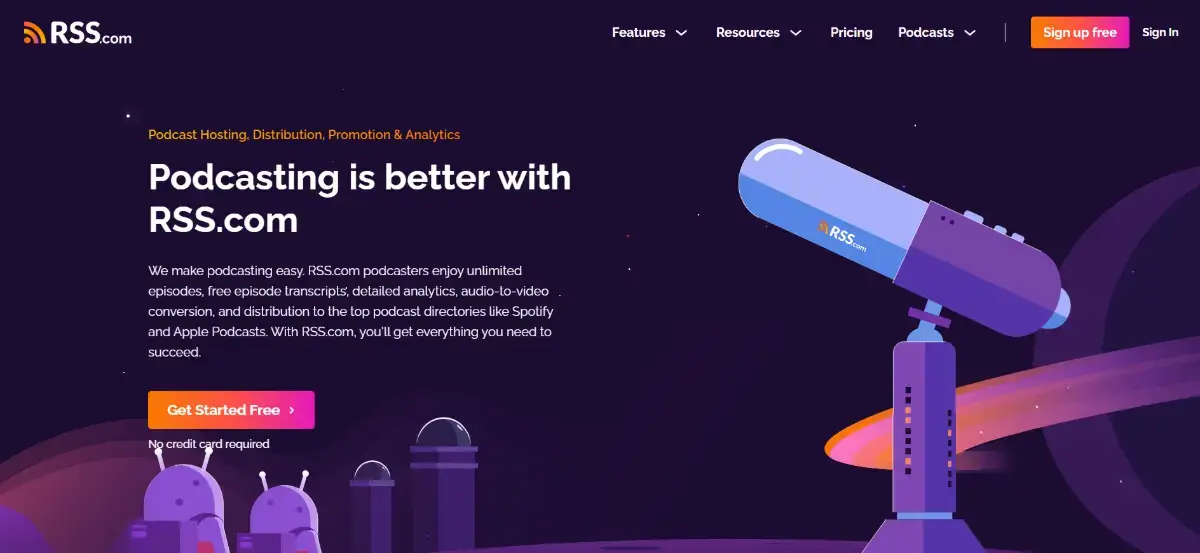
RSS simplifies podcast hosting for beginners and small podcasters.
Pros: It’s beginner-friendly and affordable, with straightforward tools for hosting and distribution. The platform provides detailed analytics, helping you track your podcast’s performance without overcomplicating the process.
Cons: Lacks advanced features like dynamic ad insertion and integrations, which might limit its appeal to professional podcasters.
Pricing: Starts at $4.99/month for students and NGOs.
12. Simplecast
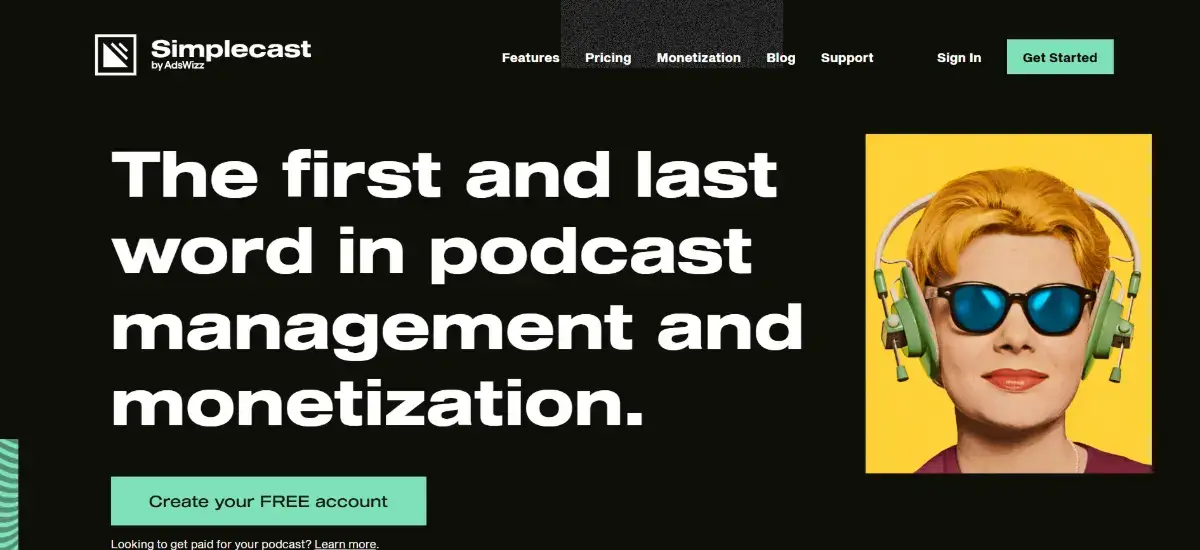
Simplecast is a solid platform designed for podcasters who are focused on growth.
Pros: It offers powerful analytics and smooth integrations. With detailed audience insights and excellent distribution tools, it’s a great choice for creators looking to take their podcast to the next level. The platform also supports team collaboration, making it ideal for podcasts with multiple contributors.
Cons: Its higher pricing might not suit small or independent podcasters.
Pricing: Plans start at $15/month.
13. Spreaker
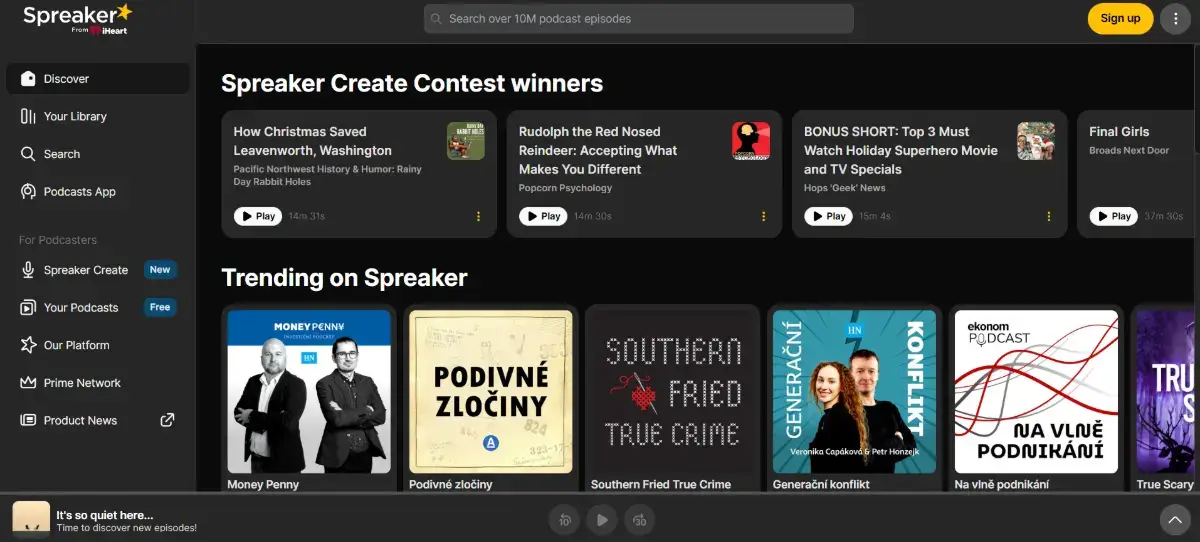
Spreaker is an all-in-one platform for hosting, distributing, and monetizing your podcast.
Pros: Great monetization tools like dynamic ad insertion and programmatic ads. Easy-to-use interface and live podcasting features set it apart.
Cons: Beginners might find the many features a bit overwhelming.
Pricing: Free plan available. Premium plans start at $20/month.
How to Choose the Right Podcast Platform for You
Choosing the right platform is key to your podcast's success. Here’s what to think about:
1. Know what you need: Figure out the must-have features for your podcast, like analytics, monetization options, and ease of use. Focus on platforms that fit your goals.
2. Set your budget: Decide how much you’re willing to spend. There are free and premium plans out there - pick one that works for your budget while offering the features you need for great content.
3. Plan for growth: Choose a platform that can grow with your podcast. As you get more listeners, you might need extra features or storage. Look for one with flexible plans you can upgrade without hassle.
4. Check the community and support: A platform with an active user community and solid customer support is a big plus. Communities can share tips, and good support will quickly handle any issues.
Can you switch podcast hosting platforms?
Yes! Don’t worry, most platforms allow you to migrate your podcast, but it's best to choose the right platform from the start to avoid complications.
How to do that?
Step 1: Pick a new platform: Start by choosing a platform that fits your podcast’s goals and needs.
Step 2: Export your files: Download your RSS feed and media files from your current platform.
Step 3: Import to the new platform: Upload your files to the new platform and double-check that all episodes and data transfer correctly.
Step 4: Update your RSS feed: Update your RSS feed link in directories like Apple Podcasts and Spotify so your listeners keep getting your new episodes.
Conclusion
Basically, the best podcast platform for 2025 depends on your specific needs and goals. Spotify for Podcasters and Apple Podcasts are excellent for reach and simplicity, while Podbean and Buzzsprout offer robust features for serious podcasters. Transistor and Captivate provide advanced tools for growth, and Libsyn remains a reliable choice with a long history in podcast hosting.
Evaluate your requirements and budget to make the best choice for your podcasting journey.
But in summary:
What is the best podcast platform for beginners? Spotify and Buzzsprout are great options for beginners due to their ease of use and comprehensive free features.
Which podcast platform offers the best monetization options? Podbean and Simplecast for Podcasters offer excellent monetization options, including ads and subscriptions.
Check out our additional resources for more tips and guides on podcasting:
